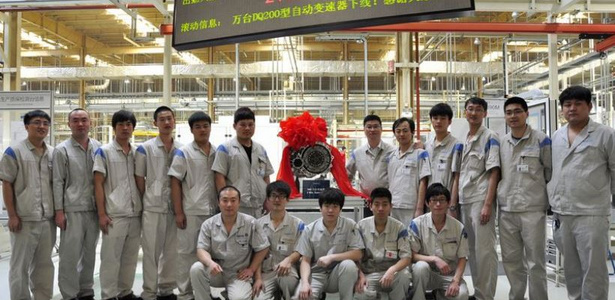GROB: Congratulations on the production of the two millionth DQ200 gearbox at the VW plant in Dalian on a GROB assembly line. The system has been in operation for four years and it was originally designed to make 2,900 gearboxes per day and is currently manufacturing 3,300 units. What exactly were the efforts required to achieve this impressive increase in production?
Klaus-Dieter Salbenblatt: The increase was possible broadly due to three factors: firstly, we were able to optimize the cycles, by, in terms of hardware at Dalian, integrating three new assembly stations into the shaft pre-assembly phase. We were able to improve the assembly process, because the 3-part synchronizer rings for gears 1-4 were no longer assembled separately on the line, but were supplied to the line pre-assembled. The second factor is the high skill level among our staff. After completing a number of targeted training sessions, our operators no longer have to wait for their colleagues in the maintenance department, if there are short interruptions to production. Because of their high skill levels, they have been able to solve many problems on their own. And the third reason is down to something that I have witnessed for years in our company, namely constant, wide-ranging TPM (Total Productive Maintenance) activities, preventive maintenance and an actively applied Continuous Improvement Process (CIP).
What challenges do you face in terms of maintenance, productivity and improved processes as a result of three-shift operations at the plant?
With three-shift operations, there is no longer any bridging time for maintenance work. To keep the unit numbers as high as possible, any problems on the line have to be addressed quickly. Also any improvements in the maintenance process take place in small steps, so that the running of the line is not interrupted.
Availability in the system is 99.8%. How do you guarantee availability at VW ATD (Volkswagen Automatic Transmission Dalian)?
We have achieved this by applying exactly the same measures that are required for increasing output numbers: a skilled workforce, TPM activities, preventive maintenance and an active CI process. In addition, within a workshop, a fixed-time meeting is called once a week involving production, maintenance and calibration/fixing technology, where drawings or the operation of fault-prone systems (such as the measuring station or robot station) can be flagged up, discussed and experiences shared.
What were the challenges during the implementation of the second assembly plant in Dalian? How was it completed with the same system and similar structure to that of the VW plant in Kassel and how long did the project phase last?
One particular challenge in terms of project management was that between pre-production at the assembly line in Kassel and pilot production in Dalian, the assembly line had to be dismantled, transported and rebuilt. In the new production hall for stages 2 and 3 of the DQ200 we only had a period of one month available. But even so, the projects were completed successfully. From receipt of order to start of production, this phase of the project took about two years.
The full plant potential can only be optimized, if employees identify with the system (soft-/hardware components). What makes your employees' work on the GROB assembly line easier?
There are several things to address here: first easy operability of the system, then come the soft-/hardware component training sessions by GROB at the start phase, a Chinese-language operating screen on the control panel and a compatible operator screen layout for all stations in Hall 2, as well as ergonomics adapted to Chinese employees.
How were the employees prepared to work on the systems?
By means of a one-week product training session on the dismantling line and a week-long systematic assembly session at the training center. There then followed trial production runs and system training session on the line.
The DQ200 gearbox is a special gearbox for a wide range of different vehicles in the Volkswagen Group. Which and how many processing steps must be carried out until the gearbox can come off the line ready for installation in the vehicle?
The assembly machining stages depend on the condition of the components at delivery and the assembly process. So, for example, the Kassel plant receives the flanged shafts as an assembled item, the factory in Dalian as separate components. The exploded view can recognize a total of 138 sub-assemblies, which are assembled by further jointing and bolting and then after acoustic and functional tests, the DQ200 gearbox is ready.
What are your experiences with GROB's assembly systems regarding quality, availability and service?
Our experiences have been totally positive. When it comes to readiness to work with us on a partner basis and with good finish quality, you can always rely on GROB.
What are your experiences with regard to assistance from GROB Dalian in terms of service quality and service availability?
As soon as the plant opened, there was always close co-operation between GROB Dalian and Volkswagen Automatic Transmission Dalian in the field of repair and maintenance of machine components.

